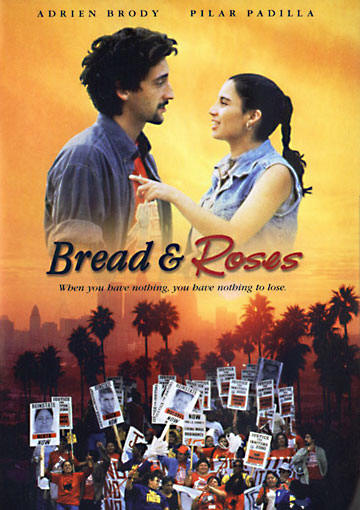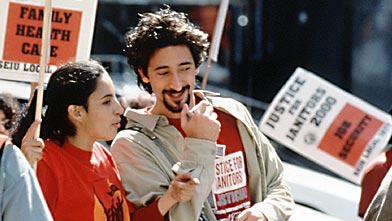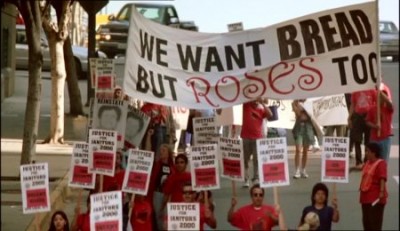

This is the fictionalized account of episodes in the Justice for Janitors campaign in Los Angeles. The film opens with Maya’s harrowing illegal entrance into the United States from Mexico and follows her travails as she secures a cleaning job in a large downtown office building. Perez, the on-site manager for the cleaning contractor, keeps workers in line through incessant haranguing. Maya bristles at this treatment, and is receptive to overtures from the cocky white union organizer, Sam, but her sister Rosa has learned hard lessons in self-preservation and wants no part of a risky union struggle, especially one led by this guy. “When was the last time you got a cleaning job?” she demands of Sam early in the film.
The best scenes in Bread and Roses are the tense conversations between workers about whether organizing is worth the risk. Maya’s would-be boyfriend, Ruben, has a law school scholarship waiting, if only he plays it safe and keeps his job. Why would Maya want to endanger her job, Ruben wants to know. She snaps back:
What was it that you said when they fired Teresa [an older woman who worked with them cleaning the office building]? “She looks like my mother.” That’s why I’m doing it. I’m doing it because my sister has been working 16 hours a day since she got here. Because her husband can’t pay for the hospital bills. He doesn’t have medical insurance. . . I’m doing it because I have to give Perez two months of my salary and I have to beg him for a job. I’m doing it because we feed those bastards, we wipe their asses, we do everything for them. We raise their children, and they still look right through us.
 Bread and Roses is engaging start to finish and can generate lots of excellent writing and discussion — about treatment of immigrant workers, tensions between immigrant and nonimmigrant workers, risks and benefits of organizing, and many others. But it’s not without its flaws. This is supposed to be a struggle to reclaim workers’ lost dignity, but the organizer, not the workers, decides every union tactic. They may be in meetings together, but Sam does virtually all the talking — deciding every move, making pronouncements about how he is going to “personally embarrass” the new part-owners of the office building. (Someone in Bread and Roses should have criticized him the way the Ramon criticized the organizer in Salt of the Earth.) And the romance between Sam and Maya was a needless and inappropriate — if predictable — insertion by writer/director Ken Loach. But these are not fatal flaws, and this is a valuable film.
Bread and Roses is engaging start to finish and can generate lots of excellent writing and discussion — about treatment of immigrant workers, tensions between immigrant and nonimmigrant workers, risks and benefits of organizing, and many others. But it’s not without its flaws. This is supposed to be a struggle to reclaim workers’ lost dignity, but the organizer, not the workers, decides every union tactic. They may be in meetings together, but Sam does virtually all the talking — deciding every move, making pronouncements about how he is going to “personally embarrass” the new part-owners of the office building. (Someone in Bread and Roses should have criticized him the way the Ramon criticized the organizer in Salt of the Earth.) And the romance between Sam and Maya was a needless and inappropriate — if predictable — insertion by writer/director Ken Loach. But these are not fatal flaws, and this is a valuable film.
By the way, Loach is a prolific filmmaker, under-appreciated in the United States. Two of his films that would make valuable additions to a global studies curriculum are Hidden Agenda, about British repression in Northern Ireland, and Land and Freedom, about the Spanish Civil War. [Description by Bill Bigelow.]
Note the film is rated R for some sexual references and obscene language.
Produced by Lions Gate Films.








Twitter
Google plus
LinkedIn